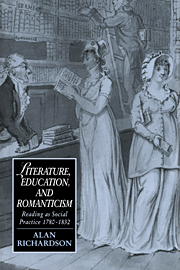4 - Women, education, and the novel
Published online by Cambridge University Press: 08 February 2010
Summary
As teachers, educational theorists, and writers for the young, British women had established a newly prominent social role by the beginning of the nineteenth century. But this decided gain in cultural authority was not without its costs. For the “Mrs. Teachwells” of the age had to work within, even more stringently than did women writers for the adult market, the domestic ideology which governed codes of literary no less than social propriety. In fact, the heightened prestige of the woman writer for or about children can be seen as a direct outgrowth of domestic ideology. Despite its significant limitations, however, the advantages of this role were considerable. Mitzi Myers has argued that the refashioning of motherhood in the “stylish new mode of enlightened domesticity” both redefined women's traditional function (at least for the upper and middle classes) in terms of “maternal and pedagogical power” and helped women writers – of children's books, of the domestic novel, of popular literature, of calls to educational reform – establish a more authoritative public voice. Myers's work provides a strong corrective to the once standard view of early women writers for children as a “monstrous” group of arid didacticists; she demonstrates instead how the growing importance of education, combined with women's seemingly natural role as mothers and domestic caretakers, could provide an opening for the exercise of “teacherly force” and “expressive power.” Such redefinitions of the maternal role also gave new weight to arguments for better, more substantial schooling for girls, who would require a more intellectually demanding, extensive education themselves if they were to later prove fit teachers of their children.
- Type
- Chapter
- Information
- Literature, Education, and RomanticismReading as Social Practice, 1780–1832, pp. 167 - 212Publisher: Cambridge University PressPrint publication year: 1994

